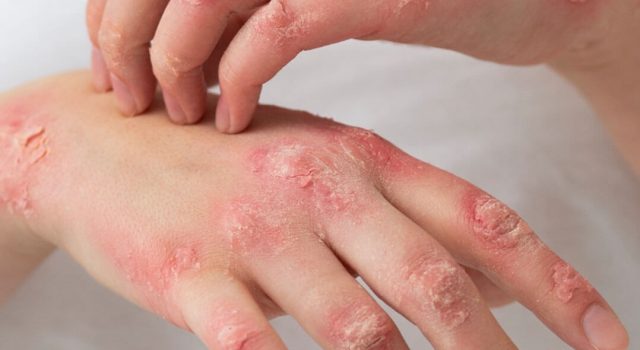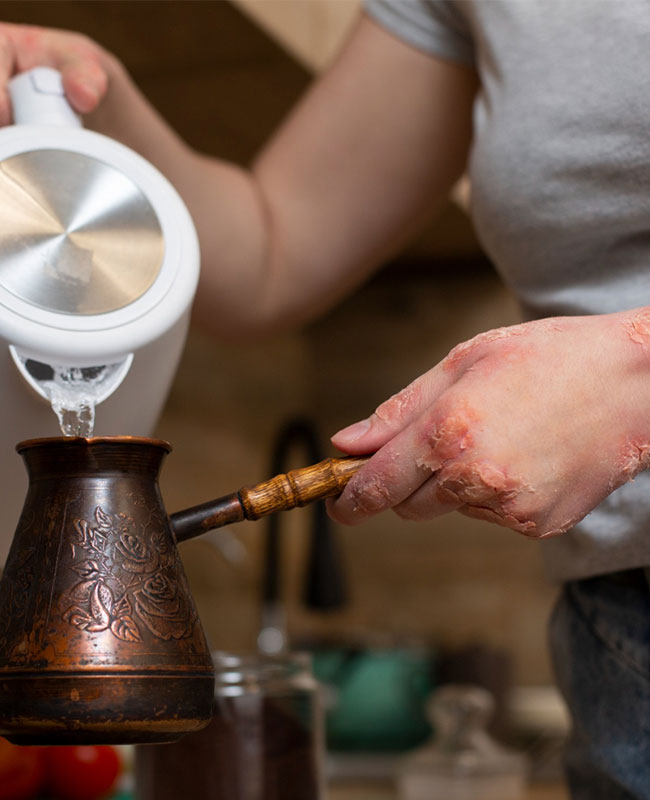Eczema
Eczema is a common skin disorder, also called dermatitis. In the UK, eczema affects 1 in 5 children and 1 in 12 adults. Globally, eczema impacts almost 20% children and 2% adults. It can affect people of any age group though it is more commonly seen in children.
Eczema is typically caused due to an allergic response to food, medications, chemicals or other substances (such as soap etc). Other things for example stress, heredity and immune deficiencies could also be the cause for eczema. The initial sensitivity can be caused by poor digestion and conditions like ‘leaky gut’ syndrome.
Living with eczema can be a struggle for those with the condition. Not only do they have to suffer with itchy, scratchy skin, but they also have to face the social anxiety that comes with eczema. There are ways to ease the symptoms and heal eczema naturally. A great starting point is to understand the differences between healthy skin and skin affected by eczema.

Happy healthy skin
If a person’s skin is healthy, their skin cells would be full with water, forming a protective barrier to shield against damage and infection (from harmful substances or bacteria). This defensive system is further enhanced with fats and oils which help the skin to retain moisture. Simply put, this is what makes healthy skin, but for people with eczema this is not the case.
Eczematous skin
For a person with eczema, their skin may not be able to produce the fats and oils as needed, resulting in the skin being able to retain less water. This means that the protective barrier is not as strong as it should be. Due to this, gaps can easily open up between skin cells because there is not a sufficient amount of water within the skin cells. Moisture is lost from deeper layers of skin, allowing bacteria or irritants to pass through with ease. It is not only ‘harmful’ things like bacteria that contribute to eczema. Some products we use daily can also contribute, like soap bubble bath and washing-up liquid. These products could remove the essential oils from anyone’s skin but for those with eczema, it could cause the skin to deteriorate faster, consequently making the area inflamed and cracked.


Why Choos Us
Understanding Eczema
Eczema is an itchy, red rash that can appear all over the body and, in particular, occurs among people who have very dry, sensitive skin. The skin can blister and crack in some cases. People with eczema are usually diagnosed with it when they are babies or young children. Babies with eczema usually have it on the face, especially the cheeks and chin, but can also have it on the scalp, chest, back and outer arms and legs. Children and adults typically have eczema on the neck, wrists, ankles and in areas that bend, like the inner elbow and knee.
Symptoms of eczema often become less severe as adults, but for some people, eczema continues into adulthood. In some cases, it can start in adulthood. The rash of eczema is different for each person and can look different or affect different parts of your body from time to time. Eczema can be mild or moderate, but there are cases where the condition becomes severe.
In eczema, there is something called the itch-scratch cycle. An intense itch can be caused by eczema, causing a person with the condition to scratch the area until it bleeds. This results in the rash becoming worse and will lead to more inflammation, meaning more itching. From here, the scratching begins again and the cycle repeats.
Symptoms of Eczema include:
Eczema signs and symptoms can vary from person to person but may include one or more of the following:
• Dry, sensitive skin
• Intense itching
• Red, inflamed skin
• Recurring rash
• Scaly areas
• Rough, leathery patches
• Oozing or crusting
• Areas of swelling
• Dark coloured patches of skin
Eczema is a general term for any type of dermatitis or “itchy rash.” There are several skin diseases that are eczemas, yet all types of eczema cause itching, redness and some will blister or peel.
Here are some of the most common eczema types:
• Atopic Dermatitis
• Hand Eczema
• Contact Dermatitis
• Seborrheic Dermatitis
• Dyshidrotic Eczema
• Nummular Eczema
• Neurodermatitis
• Stasis Dermatitis
How do we treat Eczema?
We like to treat eczema from the inside out. Eczema is a sign that the body is inflamed and the solution to treating this, would be to find the problem inside the body, then take steps to reduce the inflammation. Generally, a disturbance in the immune system is the cause for eczema; the body is overreacting to something attacking inside. Untreated long-term inflammations can lead to other health issues. There are simple and effective ways of managing the condition to reduce the effects. At Bodi Clinic, we like to use a variety of methods from functional medicine, homeopathic treatment, and nutritional support. This would ease the symptoms and allow an individual to live a happier life, though it is not a quick fix. The process can take some time and patience is needed.
Maintaining and keeping skin hydrated
Helping to keep skin plumped with water, oil and fat is essential. Emollient wash products can be used as an alternative to soaps, shampoos and shower gels that can remove the surface layer of natural oils on your skin. Emollients are non-cosmetic moisturizers which come in the form of creams, ointments, lotions and gels. Emollients help skin to feel more comfortable and less itchy. They keep the skin moist and flexible, helping to prevent cracks. One of the most important elements in managing all types of eczema is to keep the skin soft and supple by frequent and generous use of emollients. Emollients can be an effective way of helping sin to retain moisture, protect the skin and to help to ease the itching. Emollients are available as in different forms, as stated earlier, and any or all of which might be suitable to use at different times, depending on whether a person’s eczema reacts to a specific ingredient or ingredients in an emollient. There are many emollient products available that your homeopath will be able to recommend.
Allergies
Because it is prone to drying out and is easily damaged, skin with eczema is more liable to become red and inflamed on contact with substances that are known to cause allergic reaction. Many everyday materials can cause allergic reactions. Some of most common allergies are dust mites, pet dander, fabrics, seasonal pollen and foods.
There are many elements, known as ‘triggers’, in your everyday surroundings that can make your eczema flare up. As well as allergy triggers can also be linked to temperature motions and stress. Knowing your triggers is important for controlling eczema symptoms. The aim is to minimise the triggers so that the skin can become healthy again.
Calmness and relaxation
Stress can often trigger itchiness and lead to a major eczema flare-up. Learn to recognise potential situations that may cause your anxiety or worry and help them to keep calm. Always try to have some relaxation or distraction techniques if you feel a flare up is likely to take place.
Fresh air
Eczematous skin can be sensitive to temperature, and because of this, try not to overheat your
home. The body overheating can often result in a flare-up. Some people like to keep their bedroom window open to allow a flow of fresh air at night and help to reduce the skin from drying out. Before bedtime, a glass of water or a quick dose of fresh air can help to keep the skin moisturised during the night.
Comfortable clothing
Many people with eczema find cotton clothing and bedding preferable, as it is more comfortable than wool or synthetic fibres. Cotton is smooth and cool, as it allows the skin to breathe and prevents overheating. Most people prefer 100% cotton, but some can tolerate a mixture of cotton and another material. Many people with eczema can also wear silk, linen or soft acrylic next to their skin.
